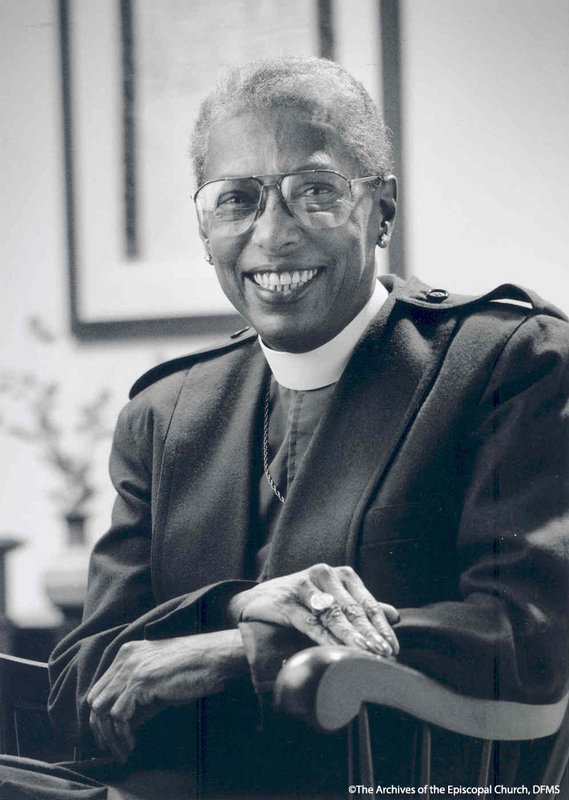Barbara Harris
Barbara Harris was born in Philadelphia, Pennsylvania where she attended Saint Barnabas' Episcopal Church. Motivated by the vital issues of the times, she moved to the more liberal Church of the Advocate in the 1960s. Alongside her busy career as chief public relations executive at the Sun Oil Company, Harris was a devoted participant in the life of her church which became the center of the black protest movement in Philadelphia. An ardent supporter of the civil rights movement, Harris participated in voter registration efforts and the Selma march with Martin Luther King, Jr..
In 1974, as a member of the Church of the Advocate where the “Philadelphia 11" were ordained, Harris lent her hands and voice in support of the Episcopal Bishops who defied the ban on ordaining women by serving as crucifer at the ordination. Inspired by the issue of women’s rights and her dedication to the church, she entered the ministry and was ordained a deacon in 1979 and a priest the following year. From 1980 to 1984, she was priest-in-charge at St. Augustine of Hippo in Norristown, Pennsylvania. She also served as chaplain at Philadelphia County Prisons, and as counsel to industrial corporations for public policy issues and social concerns. While executive director of the Episcopal Church Publishing Company from 1984 to 1988, she wrote a monthly column for the progressive Episcopal magazine "The Witness." Her powerful work as a writer elevated her stature in the worldwide Anglican community.
Barbara Harris, who became the first female bishop in The Episcopal Church shortly after the Lambeth Conference, the once-a-decade meeting of international Anglican leaders, resolved in 1988 that ordination of women as bishops was the prerogative of each autonomous province of the Communion. Elected later that year to the position of Bishop Suffragan of Massachusetts, Harris defeated four other candidates, including one other female priest. Her election was controversial, causing some conservative priests to break ties with the church. Protests ensued. Determined not to allow the controversy to interfere with her duties as Bishop, Harris stood up to the challenges brought on by her new position.
Bishop Harris was active in professional and community organizations, as well as in national church service. She served as a member of the Union of Black Episcopalians and as a past president of the Episcopal Urban Caucus. As a representative of The Episcopal Church, she was on the board of the Prisoner Visitation and Support Committee and a member of The Episcopal Church’s Standing Commission on Anglican and International Peace with Justice Concerns. Harris was also a past Vice President of Episcopal City Mission in Boston, which funds and supports programs on behalf of the urban poor.
Harris officially retired in November of 2002 and began serving as an Assisting Bishop in the Diocese of Washington (D.C.) in the summer of 2003. Bishop Harris died on March 13, 2020 in Lincoln, Massachusetts, at the age of 89.

